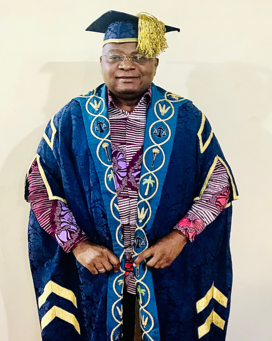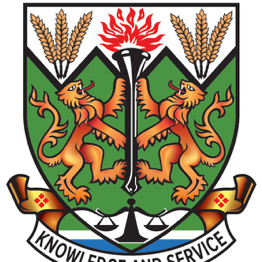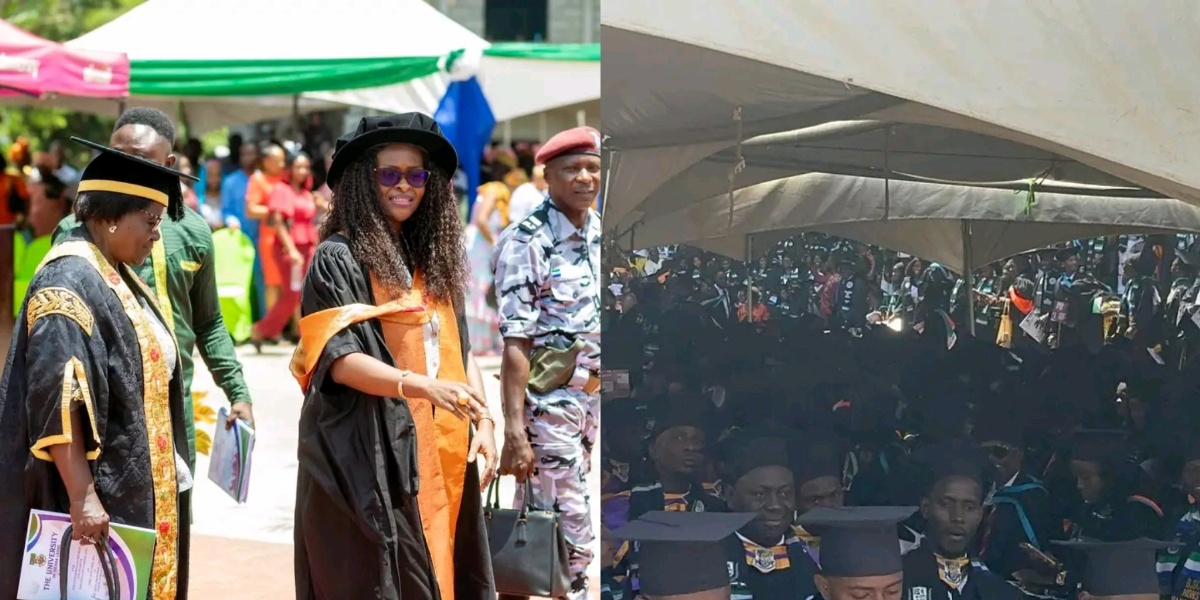
NJALA UNIVERSITY

ADDRESS
By
Professor Osman Alimamy Sankoh, D.Sc.
Ag. Vice-Chancellor and Principal
Njala University
at the
2021 Congregation Ceremony
for the Conferment of Degrees and Award of Diplomas and Certificates
Theme: Njala University- Fostering Human Capital Development in Sierra Leone
Venue: Bo Mini-Stadium, Bo City, Bo
Date: Saturday 10th April 2021
- Salutations and Opening Courtesies.
- Pro-Chancellor and Chairman of Court
- Minister of Technical and Higher Education
- Other Ministers of Government here present
- Members of the Njala University Court
- Vice-Chancellors and Principals of USL, EBKUST and UNIMAK
- Principals of other tertiary institutions
- Deputy Vice-Chancellors of Njala University and other universities present here
- Excellences, Members of the Diplomatic & Consular Corps
- Our Revered Traditional Rulers
- Your Worships the Mayors of the cities of Bo, Bonthe, Makeni, Freetown, and Kenema.
- Hon. Members of Parliament
- The Chairmen and Members of the Moyamba and Bo District Councils
- Representatives of International Organisations and Agencies
- Our Development Partners
- Alumni of Njala University
- Representatives of Civil Society Organizations
- All Staff and Students of Njala University
- Members of the Fourth Estate
- Distinguished Guests
- Ladies and Gentlemen
Today, I have the opportunity and privilege to extend special greetings and best wishes to all of you our distinguished guests and to thank you for sparing the time to come, witness and participate in the 13th Congregation ceremony of our University, Njala University.
Mr Pro-Chancellor, Sir: Today’s ceremony for the conferment of degrees, diplomas and certificates is a celebration of the success of a number of our citizens who have gone through an educational programme that has empowered them to contribute meaningfully to our national development goals.
No ceremony of this kind can be held without the sacrifices of the families, guardians, friends and benefactors, and particularly the academic staff. I therefore thank and congratulate them all. Your students will forever remain grateful to you.
This is a great milestone achieved by the students graduating today. It reflects your determination to succeed in life. As an institution we have done the best we could to give you the Knowledge, Skills and Confidence you need to face the multitude of challenges facing our society today. The rest is now up to you as Sierra Leone counts on your contributions. Please do not also forget your institution!
My responsibility to this house of congregation this morning is to highlight our responses to the call of His Excellency the President of the Republic of Sierra Leone, Retired Brigadier Dr. Julius Maada Bio, for the Universities in our country especially Njala University to take the lead in innovating the advancement of Agriculture, Education and Health in his flagship project. Shortly we will have the graduation of a total of 4,354 (four thousand, three hundred and fifty-four) males and females that we would be certifying as having met all the criteria for graduation/ award of degrees, diplomas and certificates.
Mr. Pro-Chancellor Sir, this is a direct manifestation of the continuous role Njala University plays in training the human resource potentials and needs in the fields of Education, Agriculture, Health and other components of the President’s Human Capital Development agenda and our sacred contribution as a University to that agenda he so much cherish for our development.
We have therefore coined the theme of this year’s Congregation as ‘Njala University – Fostering Human Capital Development in Sierra Leone.’
This theme is informed by our deep conviction that the President’s vision of innovative transformation of Sierra Leone is enshrined in human capital development agenda;like him, we are fully convinced that Njala University will serve as a foster parent for this innovative transformation.
Mr. Pro-Chancellor, Sir, I must at the outset note here that, amidst the numerous challenges confronting teaching, learning and research in public universities in Sierra Leone, including ours, we must salute the courage and resilience of our colleague academics and administrators for holding on to their sacred duty of contributing to nation building and development.
- The State of Njala University
Pro-Chancellor, let me now go on to give a brief update on the state of Njala University.
a. Leadership and Governance.
I’ll start by thanking the Government for the appointment of the current management team at Njala University. I consider our appointment as a special privilege and honour to serve Njala University at a time when Sierra Leone’s higher education system is at the verge of monumental transformation. We will not betray this tremendous repose of confidence in our ability to make a significant contribution to this exercise.
Pro-Chancellor, Sir, since assuming office in April last year, the priority of my administration has been to quickly reform our Financial and Administrative structures and make them more capable of generating and sustaining a conducive environment for teaching, learning and career development. This has led to the following:
- Activation of key Directorates. The Directorate of Research and Development, and the Directorate of Academic planning and Quality Assurance had been activated and are fully functional with the appointments of full-time directors. The R&D Directorate will be increasing the quality and quantity of research whilst the QA Directorate will develop, implement and monitor the much-needed quality assurance processes across the University.
- Resuscitation of Students Union Politics. My administration has resuscitated students’ politics with free and fair elections conducted using the revised constitutions on both campuses of the University, and these are now fully functional.
iii. Staff Development. Our staff profile is gradually improving with the recent completion of M. Phil and six (6) Ph.D. by our staff candidates in and out of Sierra Leone. Three (3) of our staff had undergone successful external peer review and are now confirmed as Associate Professors while three (3) other staff are currently being considered for external peer review.
b. Innovative Teaching, Learning, Research, Innovation and Community Service.
Pro-Chancellor, Sir, please permit me to provide a quick update on our core mandate as a university i.e. Teaching, Research and Community Service. I will limit these to the period since my assumption of office in April last year. In this respect, and with the current review of our curricula to meet the needs of the private sector and the demands of the Sierra Leonean society, the following key activities have been undertaken for the period under review:
- To meet the Government’s aspiration for skills development and entrepreneurship in the agriculture sector in general, NU is working with the Ministry of Agriculture and Forestry, AfDB, and a number of international partners to establish a Centre of Excellence in agribusiness education in West Africa through the support of the Government via the ENABLE NJALA Project. This Project is expected to train over five thousand (5,000) farmers (especially the youths, women and vulnerable members of the society) in Contract Farming and other agri-business related functions.
- Njala University is also playing host to the nursing and cultivation of over five hundred thousand (500,000) Oil Palm Seedlings to complement Government’s efforts to support farmers to cultivate Oil Palm crops in the country. This was achieved through the help of the Ministry of Agriculture and Forestry for the establishment of pre-Nursery of oil palm seedlets via the Agriculture Value Chain Development Project (AVDP). This project is funded by the International Fund for Agricultural Development (IFAD) and the Government of Sierra Leone to the tune of USD 1,901,000 for a period of 2 years at the initial instance.
- Currently, the University is a host to the National Comprehensive Soil Survey, the second since 1974 under the Supervision of the Ministry of Agriculture and Food Security and the National Authorizing Office for a period of two years effective 2020. The project is funded by the European Union to the tune of 450,533 Euros through the boosting Agriculture and food security (BAFS). We are conducting a national comprehensive soil survey and generate information for the utilization and management of the soil resources aimed at sustainable crop production in Sierra Leone.
- The Skills Development Fund is a Sierra Leone Government/World Bank funded project housed at the Ministry of Technical and Higher Education. NU benefitted to the tune of Le 2.2bn for a period of two years. The thrust of this project is to train youth in the cultivation and processing of mushrooms. This will lead to the establishment of a four-month certificate programme for over two hundred and thirty youth who will benefit from the programme in the Horticulture Department, School of Natural Resources Management.
- In complementing the efforts of the School of Education, we have established a national Pedagogical Centre for the retraining of teachers and instructors to enable them drive the paradigm shift from a knowledge-based, teacher-centered educational system to skills and competence-based education across Sierra Leone with a view to effectively handle the issue of teacher training which is critical in supporting the Free Quality Education (FQE).
- We are also pleased to report that the University has expanded its educational services to a number of districts including Pujehun, Bonthe, Kono, Bo and Moyamba through its Distance Learning Programmes under the School of Education with a student population of over one thousand for the 2020/2021 academic year.
- A new programme of the Infection Prevention and Control (IPC) training has been infused into the curriculum starting with our School of Community Health Sciences to be rolled out by all other Schools especially the School of Agriculture and Food Sciences.
- Njala University is set to host the second Medical School in the country as inscribed in the Universities Act of 2005 and as amended in 2014 and also a School of Public Health. This is to increasingly support Government’s Human Capital Development programme especially in the health sector by providing the human resource needed for the proposed National Public Health Agency.
- Discussions have been completed with the Sierra Leone Law School to send the first set of Law students from the Njala University Law Programme since its commencement in the 2017/2018 academic year, thus, improving wider access to the study of law programmes.
- In this day of Information and Communication Technology (ICT), we have tried to posit ICT at the very core of our research, teaching and learning activities. I am happy to report to this house of congregation, Mr. Pro-Chancellor, Sir, that Njala University was competitively selected to pilot a UNESCO funded project in Sierra Leone to support distance learning/e-learning in all Higher Education Institutions in the country and it was successfully done.
- In Community Engagement, Mr. Pro-Chancellor Sir, the current Njala University Administration has succeeded in holding a dialogue with authorities of the intervening Chiefdoms, and lasting peace and confidence building have been restored with the Local Authorities of Korie Chiefdom and the Community stakeholders.
- Mr Pro-Chancellor, Sir, I am delighted to mention the construction of the Madam Yoko Memorial Trauma Centre at Taiama, supported by the Medical Peace Foundation in South Korea and my Administration, facilitated by our Ambassador Kathos Mattai and the Ministry of Health and Sanitation.
- Njala University has continued to make significant contribution to scientific knowledge through the research efforts of our staff. Our research activities in the university have continued to gather momentum through local and international partnerships and funding. In 2020 alone, staff of this great institution have published more than thirty pages articles in good international peer-reviewed scientific journals. Publishing in these journals do not only earn points for the researchers but more importantly it contributes to strengthening the global image of the University and hence building up its institutional score among other institutions.
c. Partnerships:
The University has also maintained vibrant partnerships with a good number of international and local institutions, organisations, agencies and centres. We now also encourage our alumni in top universities and other institutions globally to serve in adjunct positions. Pro-Chancellor, Sir, let me acknowledge the generous donations received from many of our partners including Africell, Sierra Leone Commercial Bank, SALCAB, University of Illinois, USAID, Chinese Embassy, NASSIT, The Moyamba District Council, the Seawright Mining Company, NAYCOM, the National Malaria Control Programme, Peace Foundation of the Republic of Korea and Bo DICOVERC.
d. University Infrastructure, Teaching and Learning Facilities
Infrastructural development in the University has been modest, to say the least. However, we continue to provide gradual facelift across our campuses, using funds generated from donations, overheads on projects, and other internally generated revenue. The situation with furniture has improved significantly with the support of our partners, the Njala University Alumni Association and the Chinese Ambassador.
- Two-Storey Education Building, Bo Campus.
Mr Pro-Chancellor, Sir, the University administration through the MTHE handed over the keys of the newly refurbished two-story Education building funded by the Government of Sierra Leone through the Ministry of Technical and Higher Education (MTHE) to the School of Education at Towama location. We are grateful to the Government of Sierra Leone.
- Fire incident on Njala Campus.
Mr. Pro-Chancellor Sir, I regret to inform this house of congregation that Matturi Block ‘G’, a two-storey 44-bedroom male students’ hostels on Njala Campus was engulfed by fire on the night of 24th October, 2020. The fire devastatingly left many students displaced and their property burnt to ashes. The University has estimated the refurbishment cost at Le 1bn.
I am delighted to note, Mr. Pro-Chancellor Sir, an emergency government response was effectively coordinated by MTHE and the Office of the First Lady of the Republic of Sierra Leone and Njala Campus saw the fastest emergency response in history with the provision of Le 3m each to the two hundred affected students to help regain lost property and assorted food items for subsistence. On behalf of Court and Senate of the University, I want to thank you for that immediate response.
e. Finance And Investments
Pro-Chancellor, the Government’s contributions in the provision of the much-needed support to the Higher Educational Institutions (HEIs) and the Basic and Senior Secondary Education are significant. The allocation of 21% of the national budget to the Free Quality Education programme and other huge sums of money to the HEIs in the last three years are unparalleled.
On behalf of the Senate and Court of Njala University, I wish to express my profound gratitude to the Government of Sierra Leone for the recent increment of 75% in salaries of all HEI staff and the commitment to pay all Sierra Leone Grant-In-Aid backlogs and two quarters in 2020 outstanding subventions to all public Universities. This is a clear manifestation that even during the challenges introduced by COVID-19, the Government is committed to advancing the general welfare of staff across HEIs.
Pro-Chancellor, Sir, permit me to provide a quick update on few of our stringent financial measures introduced since my assumption of office.
i. Internal Controls
All transactions undertaken by the University are now verified (pre-audited) by the Directorate of Internal Audit before payment.
There is closure of financial payments over the counter. Even casual workers for the first time receive their wages through the bank.
ii. Regular Payment of other Allowances
All other allowances to the tune of over of Le1.2bn are being paid by the Institution every month (mainly funded from students’ fees collection and subvention). I am happy to inform this house of congregation, the University has not failed to honour this monthly obligation since I assumed office in March, 2020. This has been largely due to the effective internal financial control measures introduced.
f. Lessen dependence on government support
In a bid to lessen our dependence on government support, and leverage our capacity for generating our own revenue, the University has embarked on the following to mention just few:
i. Expansion of the Research and Development Directorate
The functions of the Directorate have been expanded to include “Business Development”. The expansion of duties and activities will result in two units:
- Research Services and Development – increasing the quality and quantity of research and attracting research grants to the University; and
- Business Development– ensuring non-academic activities are financially self-sustaining. This had been approved by Court as the University Business Enterprises and the Board of Directors formed. The positions of Business Managers had been advertised.
ii. Public-Private Partnerships
In order to address the perennial challenges of students’ hostels, Housing for staff, payment of benefits to retirees and deceased colleagues, electricity and water supply, and other welfare issues, my Administration has turned its attention to the Public-Private Partnership arrangements. We have engaged a number of private sector players and they have committed themselves to undertake credible investments in staff and students’ hostels and welfare issues, improvement of classrooms and provision of teaching and researching equipment.
g. Challenges
Mr. Pro-Chancellor Sir, we recognize that while we are on the right direction to put the University in its sound financial trajectory, there are still a number of challenges ahead of us. However, I will name three key ones only, because my Administration is trying all we can to address the other challenges:
First: Funding from Government has been limited and slow in coming. This situation has put a lot of pressure on the Administration to carry out activities it wants to embark on to meet staff needs and improve the quality of life for students. Both the student grants-in-aid and the quarterly subventions have never been paid on a timely basis. The implications of this perennial payment delays include undermining the University’s capacity for effective teaching and research services resulting in industrial actions.
Second: The University is still using and relying on Thermal Power to generate electricity and water needs of our staff and students on the campuses. This has a very huge financial burden on the University with its limited resources. We spend over two hundred million Leones (Le 200m) monthly to generate water and electricity on our various campuses and since the establishment of the University in 1964 Njala University has never benefitted from the national grid, especially in the main Njala Campus. We are calling on your Government’s intervention.
Finally, Mr Pro-Chancellor, Sir, the roads on our main campus at Njala are in a terrible and abandoned state and our staff and students continue to traverse through the dusty roads as they conduct the business of the University. We were quite hopeful when we saw Njala University mentioned in a Government document last year that these roads would be tarred. Sir, we are still waiting and would want to crave your personal intervention this time.
- Closing Remarks
Mr. Pro-Chancellor, Sir, I will not conclude my address if I fail to report on my one-year stewardship to the University since appointed as a caretaker Vice Chancellor and Principal exactly a year ago. I have superintended over a very transparent and accountable Administration with the unflinching support of the Njala University Court and Senate, and members of the Administrative and Academic staff.
Njala University has remained relatively quiet as my administration has adopted a dialogue approach with my colleagues in the Academic wing but also in the Administrative wing.
I have been able to institute very effective reforms to manage the meagre resources of the University in tandem with the Government’s anti-corruption reform agenda. This has been made possible by the introduction of the “Bongology” mantra as a way of life to be driven in a (FIAT) car. This car is made up of Fairness, Integrity, Accountability and Transparency. The mantra means making use of the little we have for the betterment of all and putting Njala University first over personal interest.
I want to also use this opportunity on behalf of the University Court to officially welcome our new Minister of Technical and Higher Education, Professor Alpha Tejan Wurie who as a matter of fact is not new to the Ministry, as the architect of the University Acts, we operate on. We hope to tap from his rich experience in dealing with the sector.
Let me now conclude, Mr Pro-Chancellor, Sir, by assuring you that Njala University remains committed and would continue to devise strategies to support the Government’s flagship programmes in fostering human capital development in Sierra Leone and in enhancing our capabilities in absorbing the graduates of the Free Quality Programme.
I THANK YOU ALL, GOD BLESS YOU AND I WISH YOU A ‘BONGOLISED’ CONGREGATION.



